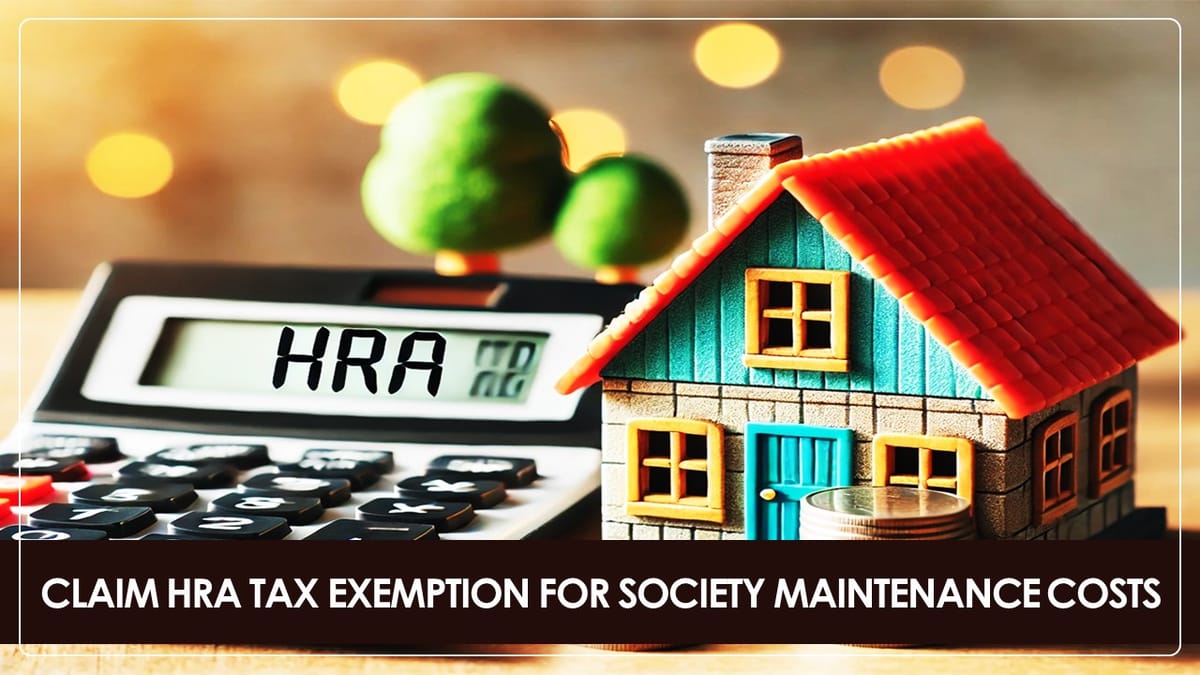If salaried individuals select the old tax regime and claim a house rent allowance (HRA) exemption for the rent paid, can they also claim a tax exemption on the maintenance fees?
Nidhi | Mar 27, 2025 |

Is it Possible to Claim the HRA Tax Exemption for Society Maintenance Costs?
Society charges, or maintenance charges, are fees collected by a housing society or apartment complex from its residents. These charges are used to maintain and manage common areas and facilities, such as lighting, gardens, elevators, security, plumbing, and other shared amenities. Many salaried individuals living in societies pay these maintenance charges along with the rent to their landlord. The maintenance charge is mentioned in the rent agreement and is a fixed amount. If salaried individuals select the old tax regime and claim a house rent allowance (HRA) exemption for the rent paid, can they also claim a tax exemption on the maintenance fees?
An expert explains that the Income Tax Act does not specifically mention whether maintenance charges can be included in the HRA exemption. However, there are two possible opinions on this. The first is that some believe that main maintenance charges can be considered a part of the rent, therefore, it could qualify for HRA exemption. Second, some people argue that maintenance charges might not be eligible for HRA exemption because the law does not specify them as a part of rent.
However, the expert believes that maintenance charges should be considered as a part of the rent if the tenant pays them to the landlord and the landlord forwards the payment to the society. Here, the landlord would not benefit from the maintenance fee amount. Including maintenance fees will also increase the amount of rent. However, if the tenant pays the maintenance fee directly to the society, then it cannot be included in the HRA exemption.
However, other experts have different opinions about this. He explains that Section 10(13A) of the Income-tax Act, 1961, states that HRA exemption is only for the rent paid for residential accommodation by the salaried taxpayer. Other expenses like electricity charges, maintenance charges, utility payments, etc., would not be considered as part of the ‘rent payment, ‘ even if they are included as part of the rent in the agreement as per the applicable provisions. Therefore, it cannot be claimed for tax exemption.
HRA (House Rent Allowance) is a part of the salary provided by an employer to an employee to help cover the cost of renting a home. If you receive HRA in your Salary and you are living in rented accommodation, you can claim a tax exemption on HRA. Under the Income Tax Act, HRA is partially or fully exempt from tax, depending on certain conditions.
An employee can claim HRA exemption based on the lowest of the following three amounts:
Here the salary includes the basic salary and the dearness allowances. Taxpayers should note that the HRA exemption is only available under the old tax regime. Those opting for the new tax regime cannot claim HRA exemption.
To claim the HRA exemption, you must submit HRA proof to your employer, or you can submit it while filing the ITR. If the proofs are submitted to the employer, a lower tax will be deducted from your salary. This exemption will be accounted for by your employer and will appear in your Form 16. However, if you claim HRA exemption in the ITR, then you must calculate the tax exemption manually. As the exemption is not claimed by your employer, the Income tax department can send you a tax notice asking for the proof of HRA claimed.
Therefore, salaried individuals should always keep documents like the rent receipt, rent agreement and PAN of the landlord (If the annual rent is more than Rs. 1 lakh). It is advised that employees should pay the rent through banking channels, as it could serve as proof that the rent has been paid by the employee.
In case of any Doubt regarding Membership you can mail us at [email protected]
Join Studycafe's WhatsApp Group or Telegram Channel for Latest Updates on Government Job, Sarkari Naukri, Private Jobs, Income Tax, GST, Companies Act, Judgements and CA, CS, ICWA, and MUCH MORE!"